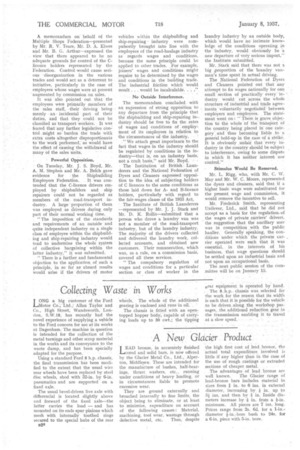A memorandum on behalf of the Multiple Shops Federation—presented by
Page 36

If you've noticed an error in this article please click here to report it so we can fix it.
Mr. R. V. Teare, Mr. D. A. Elwes and Mr. B. G. Arthur—expressed the view that there appeared to be no adequate grounds for control of the Clicence holders represented by the Federation. Control .would cause serious -disorganization in the various trades, and would act as a deterrent to initiative, particularly in the case of employees whose wages were at present 'augmented by commission on sales.
It was also peinted out that the employees were primarily members of the sales staff, their driving being merely anincidental part of their duties, and that they could not be classified as transport workers. It was fearedthat any further legislative control _might so burden the trade with extra costs altogether disproportionate to the• work performed; as would have the effect of causing the withdrawal of many of the sales units.
• Powerful Opposition. .
On Tuesday, Mr. J. S. Boyd, Mr. A. M. Stephen and Mr. A. Belch gave evidence for the Shipbuilding
Employers Federation. It was contended that the C-licence drivers employed by shipbuilders and ship repairers could. not be regarded as members of the road-transport industry. A largeproportion of them was employed as drivers daring, only part of their normal working time.
" The imposition of the standards and requirements of an outside and quite independent industry on a single class of employee within the shipbuilding and ship-repairing industry would tend to undermine the whole system of collective bargaining within the latter industry," it was submitted.
"There is a further and fundamental objection to the application of such a principle, in so far as absurd results would arise if the drivers of motor vehicles within the shipbuilding and ship-repairing industry were compulsorily brought into line with the employees of the road-haulage industry as regards wages and conditions, because the same principle could be applied to other trades. For example. joiners' wages and conditions might require to be determined by the wages and conditions in the building trade. The industrial friction which would result. . . would be incalculable. . . ."
No Outside Interference.
The memorandum concluded with an expression of strong opposition to any departure from the principle that the' Shipbuilding and ship-repairing in-. dustry should be free to fix the rates of wages and conditions of . employment of its employees in relation to the circumstances of -the industry.
"We attach great importance to the fact that wages in the industry should be regulated by conditions in the industry—that is, on an industry basis, not a craft basis," said Mr. Boyd.
• The Institution of British Launderers and the National Federation of Dyers and Cleaners expressed opposi tion to the idea of subjecting holders of C licences to the same conditions as those laid down for Aand B-licence holders, particularly with regard to the fair-wages clause of the 1933 Act.
The Institute of British Launderers —represented by Mr. J. J. Stark and Mr. D. K. Rollit—submitted that a person who drove a laundry van was not a member of the road-transport industry, but of the laundry industry.
The majority of the drivers' collected and delivered the laundry work, col lected accounts, and obtained new customers. Their remuneration, which was, as a rule, on a commission basis, covered all these services.
"The compulsory regulation of wages and conditions 'for a particular section or class of worker in the laundry industry by an outside body, which would have no intimate knowledge of the conditions operating in the industry, would obviously be a new departure of very serious import," the Institute submitted.
Mr. ,Stark said that there was not a big proportion of the laundry vanman's time spent in actual driving.
The National Federation of Dyers and Cleaners pointed out that any attempt to fix wages nationally for one small section of practically every industry would cut across the whole structure of industrial and trade agreeinents. voluntarily negotiated between employers and employees. The statement went on: " There is grave objection to the whole of the. transport 'of the country being placed in one category'. and thus becoming liable :to a general hold-up in the case of a strike. It is obviously unfair that every industry in the country should be subject to interference, owing to some dispute in which it has neither interest nor control."
Stimulus Would Be Removed.
Mr. L. Rigg, who, with Mr. C. W. May and Mr. W. C. Moore, represented the dyers and cleaners, said that if a higher basic wage were substituted for the present wage and commission, it would remove the incentive to sell.
Mr. Frederick Smith, representing Unilever, Ltd., said that he did not accept as a basis for the regulation. of _ the wages of private carriers' drivers, the suggestion that the' ancillary user was in competition with the public haulier. Generally speaking, the conditions under which the private carrier operated were such that it was essential, in the interests of his business, that wage questions should be settled upon an industrial basis and not upon an occupational basis.
The next public session of the committee will be on January 18.




























































































